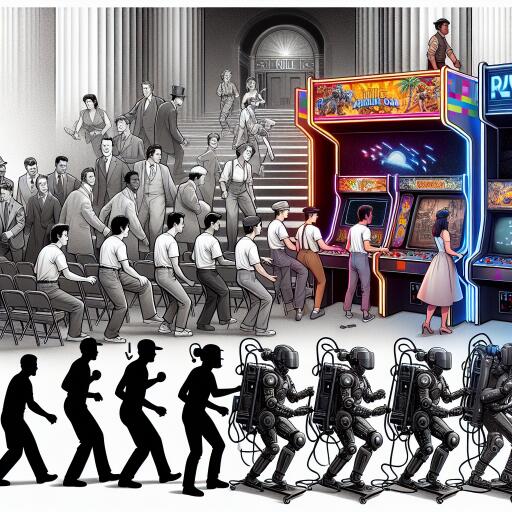How Hollywood Fell in Love with Video Games
The landscape of entertainment underwent a seismic shift recently, bridging the post-apocalyptic vistas of the popular “Fallout” series from the gaming console to the television screen. Unlike its predecessors in the form of pixelated adventures, this iteration of “Fall South” captivated its audience not as a video game, but as a critically acclaimed television series. This event marks a significant change in the tide, showcasing the evolving relationship between Hollywood and the gaming industry.
Historically, the path from video game to the silver screen was fraught with missteps and disappointment. Adaptations such as “Street Fighter” in 1994 and “Doom” in 2005 failed to capture the intricate worlds and nuanced storytelling of their original formats, often leaving fans and creators alike disenchanted. Critiques of these attempts were harsh, with some creators disowning the adaptations of their beloved games.
However, a resurgence in the quality and success of these adaptations has emerged. Notably, the world of “The Super Mario Bros” leaped into cinemas with astounding financial success, while the gripping narrative of “The Last of Us” transitioned smoothly onto television screens, sweeping award ceremonies and garnering praise from both critics and audiences. With over 70 projects currently in development, including adaptations of “Tomb Raider”, “League of Legends”, “Zelda”, and “Minecraft”, it’s clear that Hollywood’s appetite for gaming content is voracious.
One catalyst for this renewed interest is the search for fresh intellectual property. As comic book adaptations begin to wane in their box office dominance, the gaming industry presents a treasure trove of rich storylines and beloved characters. This shift is reflected in the strategic moves of streaming giants like Amazon Prime Video and Netflix, who have enthusiastically embraced game adaptations to bolster their catalogs and draw in subscribers.
The gaming industry itself has undergone transformations that make it a more appealing partner for Hollywood. The explosion in the number of gamers worldwide, propelled by technological advancements and the global pandemic, has expanded the potential audience for these adaptations. Furthermore, the demographic of gamers has broadened, with today’s industry leaders having grown up as gamers themselves, bridging the gap between these two worlds.
Today’s video games, with their cinematic qualities, complex narratives, and fully-fleshed characters, provide a solid foundation for adaptation. Shows like Amazon’s “Fallout” and Warner’s “The Last of Us” have demonstrated that, with a faithful approach, the essence of a game can be successfully translated into a television or film narrative. This is evidenced by the seamless transition of settings, plots, and dialogues from game to screen, enriching the storytelling while staying true to the source material.
Despite these successes, the road to adaptation is not without its challenges. Not all attempts have met with acclaim, as seen with Paramount’s “Halo” and Netflix’s “Residential Evil”, which fell short of expectations. The key to a successful adaptation lies in a delicate balance; the titles must either carry a universally recognizable brand or offer an engaging narrative that transcends their origins in the gaming world.
The explosive debut of “Fallout” with an episode aptly titled “The End” signifies not an conclusion, but a promising new chapter for video games on screen. As Hollywood continues to mine the depths of gaming’s extensive catalog, the fusion between these two forms of storytelling is poised to create new realms of entertainment, engaging audiences in ways never before imagined. In this evolving narrative, the journey of video games from consoles to screens illustrates a mutual infatuation that is only just beginning.









